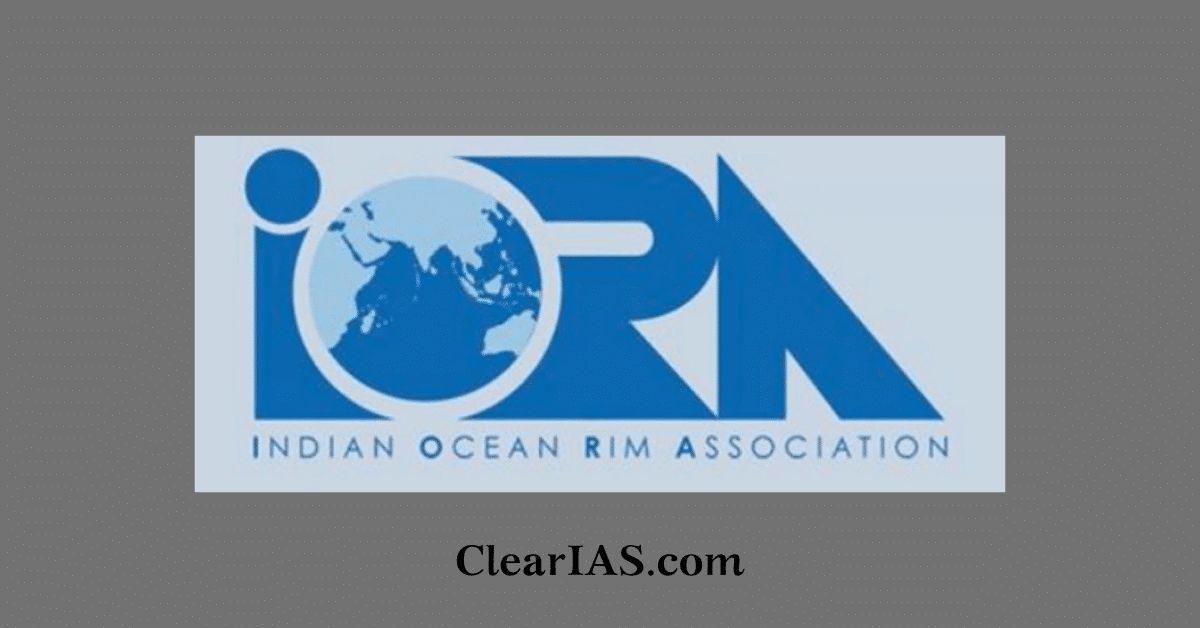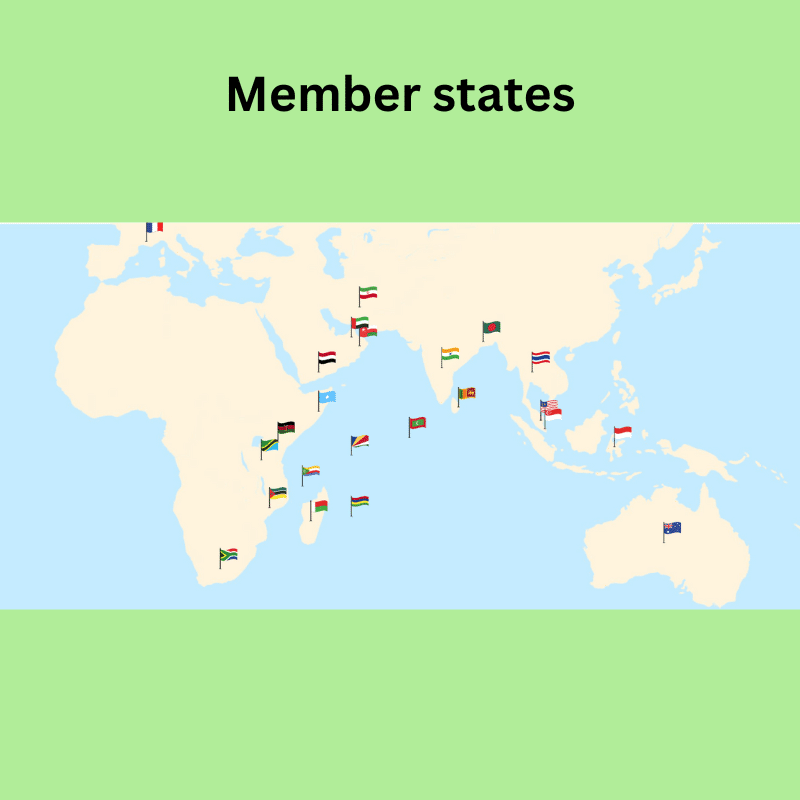
India is a peninsular nation with the Indian Ocean on its three sides.
India’s geographic location makes the Indian Ocean a key component of its foreign policy, security decisions, trade, etc.
Indian ocean rim association (IORA) was established under the leadership of India, to ensure the sustainable development of the Indian Ocean region.
What is IORA?
The idea for IORA first surfaced during the late South African President Nelson Mandela’s 1995 visit to India, where he stated:
“The natural urge of the factors of history and geography should broaden itself to include the concept of an Indian Ocean Rim for socio-economic cooperation…” This sentiment and rationale underpinned the formation of IORA. Two years later, it was established in 1997, and Mauritius serves as its secretariat.
IORA is an intergovernmental organization dedicated to fostering regional cooperation and sustainable development in the Indian Ocean region through its 23 Member States bordering the Indian Ocean and 10 Dialogue Partners. It is a regional forum that is tripartite in nature and brings together representatives of Government, Business, and Academia, in order to foster cooperation and closer engagement among them.
It is founded on the tenets of open regionalism and aims to strengthen economic cooperation, notably in the areas of investment and trade facilitation, promotion, and social development in the region.
Who are its members?
In order to advance steady growth and balanced development within the Indian Ocean region, IORA improves cooperation and communication with its Member States, namely:
Commonwealth of Australia, People’s Republic of Bangladesh, Union of Comoros, Republic of India, Republic of Indonesia, Islamic Republic of Iran, Republic of Kenya, Republic of Madagascar, Malaysia, Republic of Maldives, Republic of Mauritius, Republic of Mozambique, Sultanate of Oman, Republic of Seychelles, Republic of Singapore, Federal Republic of Somalia , Republic of South Africa, Democratic Socialist Republic of Sri Lanka, United Republic of Tanzania, Kingdom of Thailand, United Arab Emirates and Republic of Yemen.
All sovereign nations bordering the Indian Ocean are eligible to become the member of IORA. States must uphold the goals and tenets outlined in the Association’s Charter to join it.

Structure
The Council of Foreign Ministers (COM), IORA’s highest authority, convenes once a year. The People’s Republic of Bangladesh took over as Chair from November 2021 to November 2023, after the United Arab Emirates (UAE) who held the position from November 2019 to November 2021.
A committee of senior officials (CSO) gathers twice a year to advance the agenda of IORA and to consider recommendations made by working groups and forums of government representatives, business leaders, and academics for the implementation of programs and initiatives to enhance the quality of life for citizens in the Indian Ocean Member States.
Major objectives of IORA
- To encourage sustainable development and balance among member states and the region.
- To concentrate on the areas of economic cooperation that offer the most potential for growth, common interest, and mutual advantages.
- To encourage liberalization, remove obstacles, and lower trade barriers in order to improve the flow of technology, investment, and goods throughout the Indian Ocean rim.
- Priority and focus areas
- Maritime safety and security
- Trade and investment facilitation
- Fisheries management
- Disaster risk management
- Tourism and cultural exchanges
- Academic, science and cultural cooperation
- Blue economy
- Women’s economic empowerment
Achievements of IORA
- Membership expansion: The initial membership of IORA, then the Indian Ocean Rim Initiative, included only seven countries, the “Magnificent 7,” hosted by Mauritius. In March 1997, when the inaugural ministerial meeting was held and the Indian Ocean Rim Association for Regional Cooperation’s Charter was ratified, there were 14 member states. Today, there are 23 member states and 10 conversation partners. Significantly, the organization may now be claimed to encompass the Indian Ocean Region, and the influence of IORA has been substantially increased by the participation of big nations as discussion partners.
- Widening scope: IORA has broadened its scope to cover broader maritime security goals. Most notably, there is a focus on non-traditional security concerns, which are becoming increasingly significant in the marine sector as a whole, despite its initial narrow concentration on economic and trade cooperation.
- Blue economy: At the 14th IORA Ministerial Meeting in 2014, the Blue Economy, an IORA “Focus Area,” captured the interest of all IORA member states due to its potential to advance employment, food security, and poverty alleviation while promoting business models and the economies of both large and small member states. The development of a Blue Economy policy for member states has been relatively well-organized. It is led by Australia and India, two members with clearly defined plans for participating in the Blue Economy. Focus area includes: platforms for cooperation on eco-tourism; the creation of the Indian Ocean Tuna Commission, which regulates fishing in the Indian Ocean; the research and development of marine and bio-resources for medicinal purposes; and economic investment are some examples of the successful implementation of Blue Economy proposals through IORA.
Major projects under IORA
- Fisheries support unit(FSU): The National Centre for Marine Sciences and Fisheries in Muscat, Oman, is home to the Fisheries Support Unit, the first initiative financed by the Special Fund, which started operations in late 2011. The FSU’s objectives are to improve member state fisheries cooperation and to carry out research to manage and safeguard fish stocks. Importantly, the FSU is entirely dialogue-based. It neither makes judgments about the management of fisheries or matters like IUU fishing nor even offers advise on the subject.
- Regional center for science and technology transfer(RCSTT): Tehran, Iran serves as the home base for the IORA Regional Center for Science and Technology Transfer (IORA RCSTT), which was established in October 2008. The institution employs its resources to tackle problems including disaster response and building a gene bank for medicinal plants.
- Indian ocean dialogue(IOD): The IOD is a stand-alone Track 1.5 debate that was started at the 13th Council of Ministries conference in 2013 and brings together academics and decision-makers from member states to engage in discussions on issues impacting the Indian Ocean Region and IORA member nations.
- IORA sustainable development program(ISDP): The ISDP was established in 2014 with a focus on the least developed nations in an effort to close the gap between rich and poor member states by sharing best practises in the Blue Economy. The ISDP has a similar primary focus on information sharing and peer-to-peer learning to the majority of other IORA projects.
Challenges
IORA confronts a number of challenges that hinder it from developing into a highly effective and significant regional organisation. These challenges vary from structural flaws to external geopolitical tensions that penetrate IORA and prevent cooperation.
Diverse States, Diverse Objectives:
- IORA’s extensive membership gives it the opportunity to comprehend the viewpoints of a variety of countries in the Indian Ocean Region, but it also leads to disparities among member states in terms of what constitutes successful maritime security cooperation.
- IORA brings together economically and in terms of development some of the world’s richest nations, such as the United Arab Emirates, Singapore, and Australia, with some of the world’s poorest, like Mozambique, and island nations with extremely low GDPs, like the Seychelles; this results in uneven benefits from participation in IORA projects and can cause economic competition and resentment among member states.
Overlapping Regional Organizations:
- IORA competes for member states’ attention and funding with other regional and international organisations; in fact, IORA member states are members of 14 of such organisations.
Geopolitical Disputes:
- In particular, India’s deliberate exclusion of Pakistan from IORA membership has significantly hampered IORA’s ability to grow.
- Despite the fact that the India-Pakistan conflict has largely been on land, it has appeared in IORA, as mentioned above, and other regional maritime organisations.
- Recent nuclear submarine technology competition between Pakistan and India has each nation’s navy to some degree armed with nuclear weapons.
- Further fueling Indian mistrust of a crucial nation in the development of IORA, in this case a conversation partner, is China’s recent involvement in the Indian Ocean Region, particularly through the Belt and Road Initiative.
- Though experts claim that Chinese involvement in the Indian Ocean Region has the potential to considerably assist IORA projects, especially those related to the Blue Economy, India views such activity as a move to transfer power from India to China and pushes back in response.
India’s role in IORA
- India is still advocating for its stated policy of “coordination, cooperation, and partnership” in the marine realm of the region.
- India has released IORA guidelines as coordinator for the priority area on disaster risk management. In September 2019, the UN formed the Coalition for Disaster Resilient Infrastructure, and it has asked partners to join it.
- In an effort to become the primary source of information in the IOR, India established the Information Fusion Centre in Gurugram, which provides member nations with crisis information in real time. Bangladesh, Mauritius, the Maldives, Sri Lanka, and the Seychelles have all contributed to India’s information support system.
- The Security and Growth for All in the Region (SAGAR) program, which strives to make the region more inclusive, reflects Indian policy’s recognition that the Indian Ocean Region (IOR) is not an Indian-run maritime domain.
Way forward
- The Indian Ocean Rim Association(IORA) must be India’s main priority . IORA’s mission is to advance regional development that is both sustainable and equitable.
- A unique regional cooperation initiative on the blue economy must be taken into consideration by IORA.
- India just received observer status in the Indian Ocean Commission (COI). India can learn from the IOC’s bottom-up regionalism.
- With a focus on port development, connectivity, port-led industrialization, and coastal community development, Project Sagarmala must have a real impact in a timely and efficient manner.
- In all of the Indian Ocean’s littoral regions, the Coast Guard Agencies’ function becomes crucial. Therefore, the IOR littoral countries’ coast guard agencies should now be incorporated into the SAGAR vision.
- The SAGAR vision should include ways to contribute to the Sustainable Development Goals in addition to utilising the economic development potential of oceans and marine areas for member nations.
Article written by: Caroline Abraham






Leave a Reply